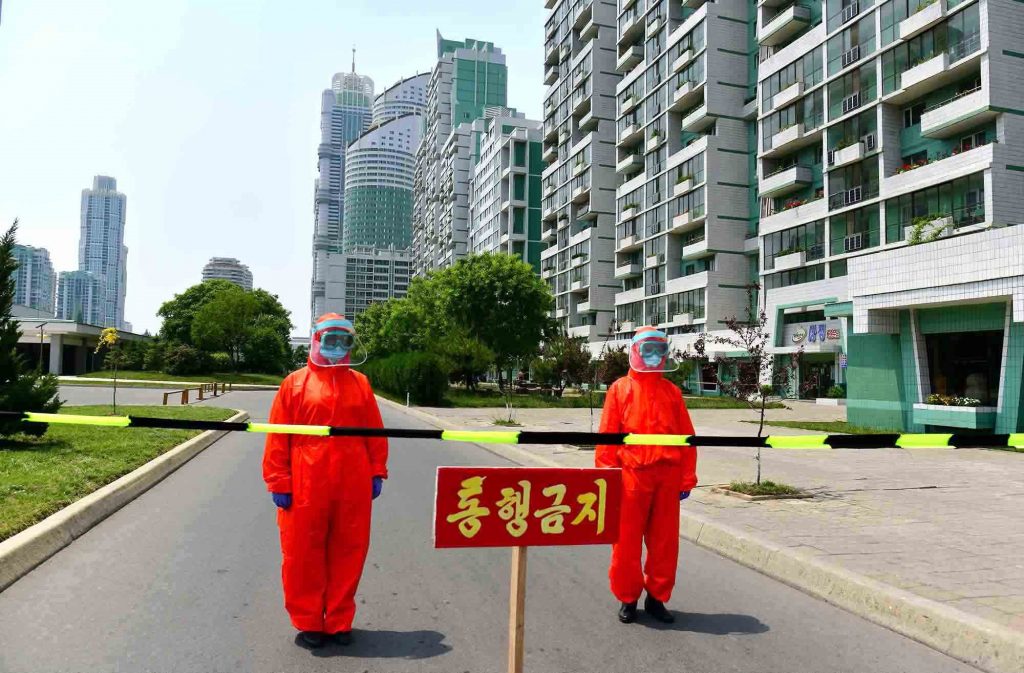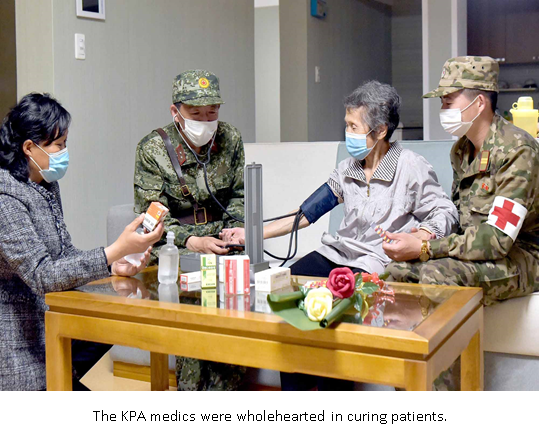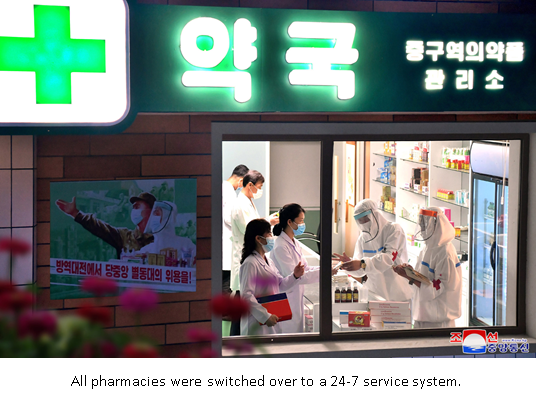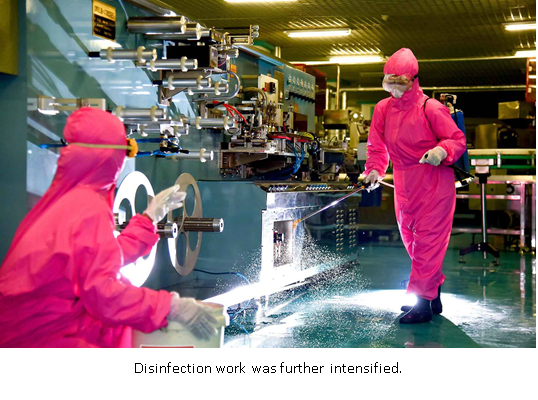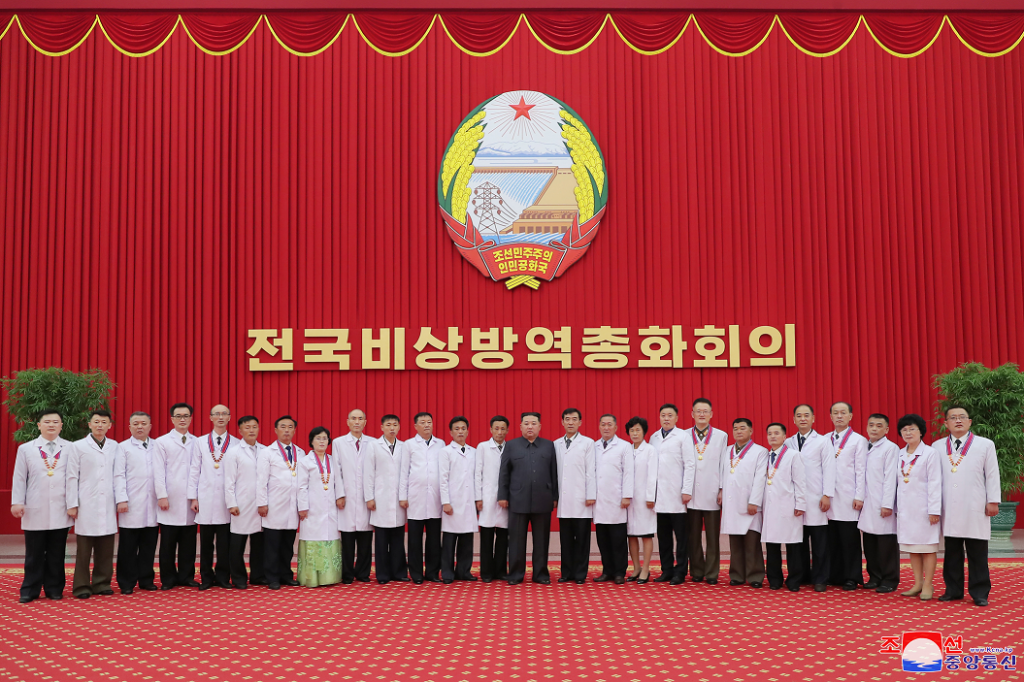
On August 10 last, the National Meeting of Reviewing the Emergency Anti-epidemic Work was held with the attendance of Kim Jong Un, President of the State Affairs, in Pyongyang, the capital city of the Democratic People’s Republic of Korea.
In his speech at the meeting, Kim Jong Un said he reached the conclusion that the epidemic crisis which was prevalent in the country has completely been tided over, and declared that the country has achieved victory in the top-level emergency anti-epidemic war of exterminating the novel coronavirus that made inroads into the territory and of defending the people’s lives and health.
As a result, the DPRK has completely removed the epidemic crisis that was unexpectedly created in last May and has been restored into a coronavirus-free zone in which there are no suspected cases and patients under treatment.
The world is still undergoing the epidemic crisis. Amazing reality prevailing in the DPRK can be said a miracle noteworthy in the world’s healthcare history. It is quite meaningful.
Insoluble Mystery
In last May an unforeseen emergency occurred as the malignant virus made inroads into the territory of the DPRK which had remained in peace for more than two years by the country’s strict measures against coronavirus since the initial days of the outbreak of pandemic.
The Workers’ Party of Korea and the DPRK government promptly responded it with an overall, resolute and offensive anti-epidemic war.
Since May 12, the state emergency anti-epidemic work was switched over to the top-level emergency anti-epidemic system and measures were taken to blockade the whole country region by region and to cut off the work, production and living units from one another.
Accordingly, intensive examination and checkup of all the population have been conducted across the country, the reserve medicines of the state have been immediately released and all pharmacies operated under the 24-7 service system. Almost 3 000 combatants of the medical field of the Korean People’s Army were seconded to supply medicines and treat patients in Pyongyang. More than one million officials, teachers and students of the anti-epidemic and public health sectors took part in intensive examination and medical checkup in relevant regions. In fact, the measures were unprecedented in the world as no other country had implemented such measures so thoroughly.
Thanks to above-mentioned measures, the daily number of fever cases that recorded hundreds of thousands in the early days of the spread of the malignant virus decreased to less than 90 000 one month later; the number then continued to decrease, and since July 29 no suspect case or patient under treatment was reported. Those who have died in this period number 74 in total, a record low, which would be called an unheard-of miracle in the world public health circles in terms of the fatality rate. This tremendous success achieved in anti-epidemic war that has lasted for over 100 days since the Covid-19 made inroads into the territory of the DPRK and for a matter of 91 days since the top-level emergency anti-epidemic system was put in place, is a miracle noteworthy in human history and a great victory achieved by the Korean people.
As regards to the anti-epidemic war in Korea, the world commented in admiration it as an insoluble mystery and legend-like reality.
What Kind of Factors Brought about the Legend-like Reality?
The amazing miracle wrought in the anti-epidemic war is attributable to following facts.
First, it is attributable to preemptive and offensive, scientific and strict measures against COVID-19 taken by the WPK and the DPRK government.
With the establishment of a top-level emergency anti-epidemic system as soon as the anti-epidemic crisis came, the WPK and the DPRK government adopted appropriate and optimum policies in time to manage the situation of the outbreak of the infectious disease and block the source of its spread.
In particular, the strong measures of locking down every region and every unit across the country played a decisive role in reversing the prevailing anti-epidemic crisis in a short period of time. In fact, these were strict measures which no other country could adopt except the DPRK.
Second, it is attributable to a high sense of organization, voluntary unity of action and purposeful enthusiasm on the part of the entire population.
The measures of locking down every region and every unit across the country were a severe trial for the Korean people.
However, an iota of vacillation, weakness, pessimism and fear was not witnessed among the Korean people. Firmly united around the leader and the Party, they displayed an excellent trait of regarding all the anti-epidemic measures, regulations and directives as a natural mission for the sake of the state, their families and for themselves, observing them voluntarily and conscientiously and executing them without fail. The fortitude and joint efforts the Korean people displayed in unanimously responding to the state’s policy served as a source of strength unique to the DPRK which enabled the country firmly standing a good chance of winning in the anti-epidemic war.
Third, it is ascribable to the people-oriented character and vitality of the public health system set up in the country.
Even though the foundations of the anti-epidemic work and material and technical foundations of the public health sector were weak and the country was inexperienced in this work, the district doctor system, emergency medical service system, telemedicine system and other people-oriented and advanced medical service systems that have established for past decades were put into effective operation. During the top-level emergency anti-epidemic period, more than 71 200 public health workers and over 1 148 000 hygiene activists were mobilized across the country every day for the anti-epidemic and treatment works, while thousands of former public health workers volunteered for this effort. In particular, the KPA medics who were seconded to the capital city on the special order of the Central Military Commission of the Workers’ Party of Korea have performed outstanding feats on the front of the emergency anti-epidemic war. Thus the formidable anti-epidemic and treatment tasks could be carried out successfully.
Fourth, it is attributable to the communist virtues and traits displayed by the Korean people.
During this period, the Korean society’s tenderness and human feeling of helping and caring for one another in the face of hardships were displayed more warmly and strongly. Various types of more than 8 000 mobile service groups were organized, and many people sent medicines, materials for anti-epidemic work, food grains and fund to the anti-epidemic and curative and preventive organs and the needy families. Such benevolent supporters were everywhere–in the capital city and provinces, in factories and rural and fishermen’s villages–and include the broad sections of society, ranging from officials to even children’s union members.
Fifth, it is attributable to the outstanding leadership of Kim Jong Un, President of the State Affairs of the DPRK.
In fact, Kim Jong Un, endowed with far-sighted clairvoyance and ardent love for the people, wisely organized this campaign and unyieldingly led it to a successful conclusion.
He took series of appropriate and resolute special measures in the early days of the outbreak of the worldwide public health crisis and put forward original strategies and tactics at important meetings of the Party held on several occasions. He also had reserved medicines prepared by his family sent to needy families and visited in person the pharmacies in Pyongyang to learn about the supply of medicines. During the top-level emergency anti-epidemic period, he gave teachings and tasks on over 580 occasions, went over 22 956 pages of 1 772 documents. These facts are an eloquently proof of how painstakingly he made efforts for the emergency anti-epidemic war. Through the emergency anti-epidemic war in the DPRK, the world came to appreciate President Kim Jong Un more keenly.
